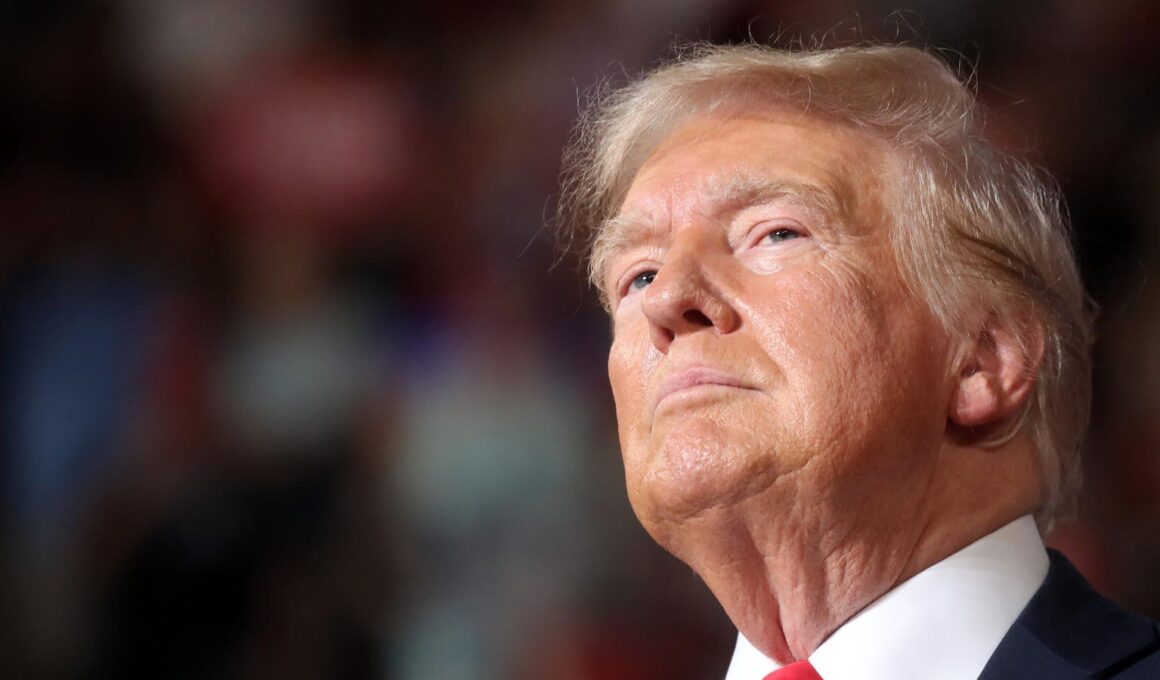Topline
Former President Donald Trump’s federal case for trying to overturn the 2020 election is now moving forward again after the Supreme Court gave him some immunity—but a trial won’t come anytime soon, as the judge overseeing the case granted Special Counsel Jack Smith’s request for more time to propose how the case should play out and it will likely take months to figure out how to apply the Supreme Court’s opinion.
ormer U.S. President Donald Trump speaks at a rally on July 31 in Harrisburg, Pennsylvania.
Key Facts
The federal election case returned to U.S. District Judge Tanya Chutkan last week, after the case had been on pause for months while the question over Trump’s immunity played out.
The Supreme Court ruled in July Trump cannot be charged for “official acts” he undertook while president—but for the most part left it up to Chutkan to interpret that, only saying Trump is immune from charges over pressuring Justice Department officials to help challenge the vote count.
Chutkan told Smith, who’s overseeing the prosecution, and Trump’s lawyers to submit a status report by Friday, but Smith asked for an extension to submit the report until August 30, which the judge granted Friday afternoon.
The extension request stretches out what’s already likely to be a lengthy process for determining what charges against Trump can be prosecuted, as Chutkan will have to first rule, and Trump is then likely to appeal whatever she decides to an appeals court, and potentially the Supreme Court after that.
It remains unclear how the process of narrowing Trump’s indictment will play out: Smith could submit an updated indictment that takes out some of the charges against Trump, and some legal experts have suggested Chutkan should hold a “mini-trial” to determine what evidence can be used—which would get public attention on the case against Trump and force him to defend himself before a full trial.
However the case proceeds, it’s certain the case will not go to trial before Election Day—and, if Trump wins, he will likely kill the case entirely, as he can appoint DOJ officials who would have the charges dropped.
Get Forbes Breaking News Text Alerts: We’re launching text message alerts so you’ll always know the biggest stories shaping the day’s headlines. Text “Alerts” to (201) 335-0739 or sign up here.
What To Watch For
In her order granting Smith’s extension request, Chutkan also scheduled a hearing in the case for September 6, delaying it after the conference was originally supposed to take place August 16. It’s only after that point that there will be a clear sense of how long the case could take to play out from here. That also means the election case will be heating up not only as the election nears, but as Trump faces his criminal sentencing in Manhattan on September 16—which was also delayed in light of the Supreme Court’s immunity decision, as Trump has asked for the verdict against him to be thrown out.
Contra
While Smith’s request for an extension further drags out the case, some legal experts cheered his decision to ask for more time, arguing it’s advisable for the prosecutor to be thorough since it’s already likely to get held up again in appeals courts. “The Special Counsel’s job is to move his case forward, as quickly as possible but taking due care to get it right,” former U.S. attorney Joyce Vance wrote Thursday, arguing the process of figuring out what charges can move forward “will be better organized, and perhaps even streamlined, if Smith makes productive use of the additional time he is asking for.”
What Can Trump Still Be Charged With?
It’s still hard to say what charges against Trump in the federal election case will move forward, as the Supreme Court’s ruling was largely vague on what in the indictment constitutes an “official act” and gave Chutkan wide latitude to weigh the charges herself. Legal experts criticized that ambiguity to Politico, saying it makes it all but certain the case will make its way back to the high court by giving Trump more room to dispute Chutkan’s decision. “You could understand this as sort of an exercise in kicking the can down the road,” University of Virginia law professor Sai Prakash told Politico. That being said, legal experts at Just Security who analyzed the indictment after the Supreme Court’s ruling argued many of the charges should be able to survive, believing major parts of the indictment—like Trump and his allies’ scheme to submit false slates of electors to Congress and Trump using private attorneys to spread false election fraud claims—shouldn’t be considered “official acts.”
Surprising Fact
The DOJ has a longstanding rule that prohibits the agency from taking major steps in investigations within 60 days of an election that could influence the vote count. That rule shouldn’t apply here, Vance noted, as it applies only to cases where indictments haven’t been brought yet and for actions like bringing an indictment or executing a search warrant. At this point, the election case is ultimately up to the judge rather than the DOJ, so its rules shouldn’t be a factor.
Key Background
Trump was indicted in August 2023 in federal court for trying to overturn the 2020 election, with prosecutors bringing four felony charges against him for conspiracy to defraud, obstruction and conspiracy against rights. He has pleaded not guilty to the charges, which he has decried as a “witch hunt” designed to hurt his political campaign. The charges are broadly based on four schemes by Trump and his allies to subvert the election results: pressuring state officials to change the results, the “fake elector” plot, using the DOJ to challenge the vote count and Trump trying to block Congress from certifying the results on January 6. Trump challenged the indictment based on claims he’s “immune” from criminal prosecutions, repeating arguments he’s made in many of his criminal and civil cases. While lower courts rejected those claims, with both Chutkan and a panel of appeals court judges ruling against Trump before the issue made it to the Supreme Court, the high court was more receptive. The justices’ ruling in favor of giving Trump and other ex-presidents immunity for official acts has garnered widespread criticism on the left, and Democrats have introduced legislation and a proposed constitutional amendment seeking to undo it—though those are extremely unlikely to pass.
Further Reading









